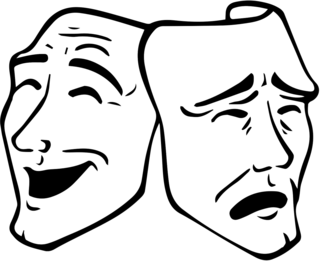Trauma
The Oscars Show Nobody Expected
Here's what the drama teaches us about our humanity.
Posted March 28, 2022 Reviewed by Davia Sills
Key points
- It's a uniquely human challenge to work with quick-moving internal changes, especially those that hit individual or collective trauma.
- It is easy for us to oversimplify and reduce both parties in a dramatic dustup.
- Trauma and creative triumph may be closer together than they appear at first.
- We do better to see the full complexity and nuance of this drama rather than stay with the headline.

What happens when a joke cuts too close to the bone? When we're mobilized to protect the ones we love and our own reputation in the face of profound shame? What happens when this joke comes at a moment so close to triumphing over individual and collective trauma? How do we manage these multiple sides of self that threaten to shock not only ourselves but the audience watching at home?
These questions—and many more—came to mind watching last night's Oscars and the all-too-human display of how quickly a seemingly innocuous jibe can degenerate into anger, conflict, and undoing.
If you missed it or didn't hear about it yet, Chris Rock was doing his typical schtick, riffing on the perennial theme of "hell hath no fury like a woman angry at her husband's misstep." At first, it was a softball pitch. Javier Bardem would be in big trouble if he won an Oscar while his wife Penelope Cruz lost hers. Such a playful and common trope, Bardem and Cruz couldn't help but beam back their knowledge of the trap set before them, even miming along with the inner drama.
Unfortunately, Rock's next joke landed like a fastball to the heart. Even with a disclaimer in the windup, "Jada, I love you," it was a stinger. In form, it wasn't different from many of the roasting jokes we typically see at the Academy Awards. Find something about the person, exaggerate it, and connect it to the movies we love. And yet, there was something in the hidden fault lines underfoot that surprised us all.
"Can't wait to see you in G.I. Jane 2."
Like many jokes that hit painful truths, this one brought a moment of shame doubled over. We watched a husband in the helpless bind of sitting and taking it while his wife was mocked for the alopecia condition of which she has no control and which takes so little away from her beauty or character. We also watched a rightfully proud man set on the precipice of winning a career-defining award in an indomitable role highlighting the fight and triumph over years of collective trauma. We watched in real time Will Smith revisit his own personal trauma of watching his mother physically beaten by his father and not being able to do anything about it. Finally, we witnessed two African American men ironically and sadly squandering a moment that was all lined up to heal past legacies of injustice, discrimination, and division.
These aspects of self—these ghosts of individual and collective trauma—came summoned from their sleep in the form of the fast-moving zombies we are so now easily accustomed to on television. Think "The Walking Dead." Denzel Washington, just coming off his brilliant role as Macbeth, so presciently advised Smith after the slap heard around the world, "At your highest moment, be careful: That's when the devil comes for you."
The diabolical—the Greek word for "throwing apart"—is always at the ready to guard and reenact trauma, just as the symbolic is "throwing together," emerging healing and transformation (Kalsched, 1996). All of us are so unusually sensitive to this process, and it's why I don't feel anger, judgment, or blame towards either Chris Rock or Will Smith.
I feel sad that they both got caught in the crossfire of how trauma and the human psyche work, how quickly one man's innocent words can activate a conflagration inside the other, and how unfortunate it is that we are all subject to the caprices of the human spirit and of trauma itself.
Watching Will Smith's face in his acceptance speech was like watching Othello receive an award after his unfair and malicious undoing by the envious Iago. It was challenging but important to carry the ambivalence of this moment of triumph coupled with both personal and collective moments of injustice all rolled into one. And it's also instructive to hold the unfortunate missteps of human imperfection, our capacity to hurt without intending or realizing that we might. And this goes for Mr. Smith and the slap in the face payback as it does for Mr. Rock's initial joke.
You could see the humanity and after-the-fact contrition in Chris Rock's face. He seemed to mean the joke as a "between comics" playful dig, thinking he had set the ground for respect and love before he pretend-pulled the trigger. My guess is that he didn't intend for his joke to go so deep and only realized what he had unleashed after it was out of the bottle.
We never quite know when we will have mistakenly offended, hurt, or shamed someone when our intention is playful and it hits on something dead serious. It is the great irony of the human condition that one's man's jibe is another man's undoing, and that none of us are truly immune from being on both sides of this.
I'm not saying Mr. Rock is completely blameless. His words were tone-deaf in context, and if he did know about Ms. Pinkett Smith's alopecia, he should have thought through the implications and struck the joke from the set. But what I'm more interested in is how very human it is to make these kinds of missteps and that it might more be a place for all of us to have a "there but by the grace of God go I" moment.
In the face of so much polarization and division these days, it's easy to go with the simplistic trope. A man says something patently offensive and hurtful and should be censured, and another man responds from a reactive place of retribution and should be censured too. Or shall Mr. Smith be praised for taking matters into his own hands and protecting the honor of his wife? Who is the hero, and who is the villain here?
I'm not so comfortable with either one-dimensional story somehow, and that is what has me so bothered by it. I feel for Mr. Rock just as I do for Mr. Smith.
With more context to Rock's story, I've learned of a man who has found a way to use his fast-moving verbal prowess to offset the limitations of a condition known as a non-verbal learning disorder, one that makes it extremely difficult to read the non-verbal social cues that make up a large portion of communication. I couldn't help but feel for his deer-caught-in-headlights moment up there, too, and feel compassion for him even as he "perpetrated" the crime. I've also heard Mr. Rock's struggles with his own marital challenges in his comedy bits of late and wasn't surprised that this trope is also very personal to him too. Ironic, again, that we so often project what is going on inside in order to figure it out, and yet, at times, this threatens to hurt the very ones we respect and admire.
I've seen Facebook posts saying both men are egotistical, self-absorbed, and irresponsible in their actions, but I think the reality of them and of us is much more complex. And that's why I think this moment represents best the comedy and tragedy masks that symbolize the field of drama. They should help us look at and own more fully this easy and quick shifting we all can do between our best and worst selves. And don't we all need another chance so that someone will see us through the dark and triumphant moments that we all crave so much more than applause?
References
Kalsched, Donald (1996). The Inner World of Trauma: Archetypal Defense of the Personal Spirit. London: Routledge.




